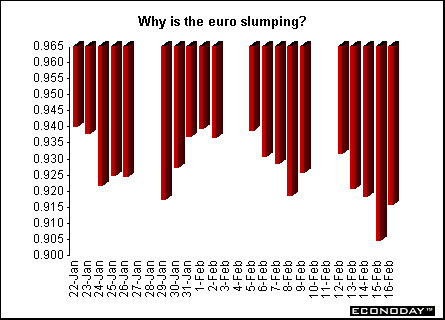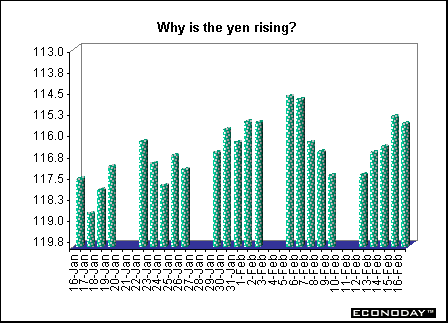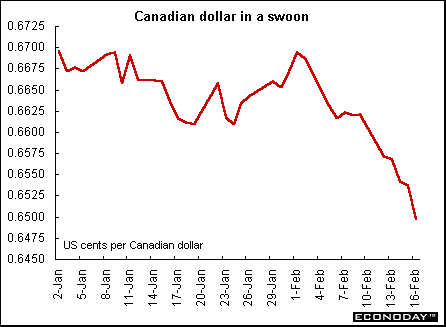
Currencies
The euro continued to sag when the European Central Bank left interest rates at their current 4.75 percent level after their Thursday meeting. Those who are uneasy about Europe's ability to stave off a U.S. induced decline are concerned that the ECB won't act in time to stem slowing growth.

The dollar gained against the euro after Fed Chairman Alan Greenspan suggested the United States isn't likely to slip into recession. The perception has grown that the United States will recover in the second half, which would push demand for the dollar higher. Traders said the market was "overdone" on U.S. doom and gloom. Still, even after its recent decline the euro has gained almost 10 percent against the dollar since late November amid evidence of a slowdown in the U.S. economy. Better growth prospects in the euro region strengthens the euro by drawing in investors to European financial assets and the currency with which to buy them.
U.S. Treasury Secretary O'Neill threw the currency markets a knuckle ball via interviews on his arrival in Europe. His remarks were interpreted to mean that he was not a strong dollar advocate. Treasury staff later said that the United States still advocated a strong dollar policy. Confusion about a new administration's policies on the strong dollar and its commitment to globalization continues to worry international markets. It is always a period of uncertainty when a new administration takes office, especially now with no Wall Street veteran near the top.
The yen rose against the dollar after Bank of Japan Governor Masaru Hayami said it would be "unreasonable'' to cut interest rates to zero, dousing speculation the central bank will cut rates to boost the economy. At its last meeting, the Bank unexpectedly cut its discount rate, at which it lends to member banks, 15 basis points to 0.35 percent, while keeping its benchmark rate, at which banks lend to each other, at 0.25 percent. The only reason the interbank rate would be cut to zero is if "the economy slipped into real bad shape, such as a deflationary spiral," where falling prices erode profits, forcing companies to trim wages and giving consumers less to spend, said Hayami.

The yen rose amid speculation Japanese exporters and institutional investors were converting overseas earnings into their home currency before the March 31 end of the fiscal year. The yen may continue to do well until the end of March, at which time investors will make decisions based more on the state of Japan's economy. Repatriation of the yen before March 31 has helped Japan's currency rise in February for six of the last eight years. A 12 percent slump in the yen this fiscal year gives an extra incentive because it boosts the value of overseas assets when brought home.
The Canadian dollar fell below 65 U.S. cents for the first time in more than two months after Nortel Networks Corp., Canada's biggest company by market value, said it will have a loss in the first quarter and plans to cut 10,000 jobs because of slowing U.S. demand. Selling of the shares by overseas investors hurts the currency. The Canadian dollar ended at a new two month low Friday, capping a disastrous week that saw the currency drop nearly 2 percent against the U.S. dollar in just five trading sessions.

The Canadian currency also ended sharply lower against the euro when comments from U.S. Treasury Secretary Paul O'Neill were interpreted as signaling a Bush administration shift away from a strong dollar policy. Later in the session, as if to add an exclamation point to all the other bad news afflicting the Canadian dollar, the U.S.-led air raid on Iraqi radar facilities sparked safety bids for U.S. dollars, as typically happens at times of global conflict.


Introduction • Global Stock Market Indexes • Recap of Global Markets • Currencies • Indicator Scoreboard

The Bottom Line • Looking Ahead
|